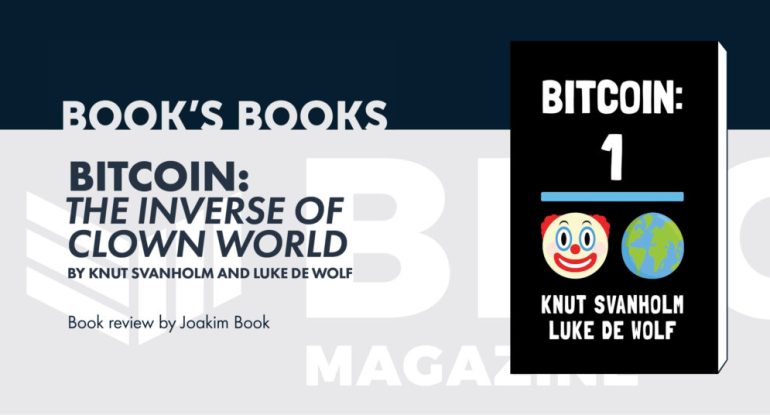Reality Restored

Bitcoin: The Inverse of Clown World by Knut Svanholm and Luke de Wolf, Lemniscate Media, 175 pages, $25.00.
This is a book review from The Mining Issue of Bitcoin Magazine Print. Get your copy here.
—
It’s interesting to notice a recurring theme in the Bitcoin books that have come out this past summer: they all seem to be centered around personal growth and a kind of spiritual awakening. It feels like, as a community, we’ve moved past the initial discussions of what money is, its history, or how it functions in today’s world—or even the specific technical differences Bitcoin brings to the table.
Instead, our minds are now focused on exploring life *with* Bitcoin. Bitcoin has cultivated its own culture, and its core principles and values naturally nudge its users in certain directions. We see this in [Aleks] Svetski’s work, where he delves into classical virtues and how embracing them enriches our lives under a Bitcoin standard. Similarly, Mekhail explores intentional parenting with a long-term, Bitcoin-focused perspective in mind. And in Bitcoin: The Inverse of Clown World, Knut Svanholm, alongside his podcast co-host Luke de Wolf, offers us “a journey of introspection and self-improvement” (as they put it on page 11). This isn’t just a book about Bitcoin; it’s “a book about you” (page 13), echoing [George] Mekhail’s approach to raising children.
Frankly, it’s an incredibly engaging and thought-provoking read, packed with insights into the absurdities of our current world. The chapter titles are genuinely slick, and the chapters themselves are easily digestible and relatable. If how often I laugh out loud, reach for my highlighter, or bombard my friends with quotes is any measure of a book’s quality, then Inverse of Clown World scores exceptionally high marks. It’s a brilliant mix of light, easy reading and some seriously impactful ideas—all generously seasoned with humor.
What really grabs you about Inverse is how it points to the sheer absurdity we see in the world around us—the political posturing, the confusion around identity, and the widespread moral, financial, and political decline—and demands we ask: Why is all this happening? How did we get here? It all feels so pointless and, frankly, so dumb.
Svanholm and de Wolf have an answer, and it’s “more straightforward than you might think. When the money stops working, everything becomes political and a farce” (page 51). The book’s central argument, quite surprisingly, is that this moral and societal breakdown is a consequence of broken money.
Right from the start, they plunge us into praxeology—that somewhat obscure, philosophical foundation of Austrian economics. From there, we journey outward, connecting high-level academic economics and mathematics to popular culture through Christopher Nolan’s The Dark Knight, and even exploring reciprocal altruism in nature and its mirror in online human interactions. It truly ranges from the profound to the everyday.
Around a dozen pages in, it feels like you’re reading a textbook explanation of markets and the classic economic thought experiment, the prisoner’s dilemma. The authors draw crucial insights from the modern discussions surrounding this game theory concept: “[economist Robert] Axelrod’s findings emphasized the importance of being friendly and forgiving, but also appropriately retaliatory” (page 19). They highlight that “The balance between self-interest and cooperative behavior is crucial in the game of life, where decisions shape futures” (page 21).
Now, what all this has to do with “Clown World” might still be a bit hazy at this point, and you do have to wait about fifty pages for a clearer picture of exactly what the authors mean by that label. But honestly, if you’ve ever read Svanholm’s work before, or tuned into the Bitcoin Infinity Show—or, you know, haven’t been living under a rock for the past decade or so—you probably already have a pretty good idea.
Many of their descriptions are intentionally broad, which makes sense when you’re trying to capture something that essentially means “everything stupid.” It’s fueled by the desire for something for nothing (page 41). It’s a world “where pleasing bureaucrats becomes increasingly profitable, while providing as much value as possible to your fellow man becomes increasingly futile” (page 50). Clown World arises directly from a corrupted, political money system, “which makes people focus on totally arbitrary issues” (page 65); in fact, many of the things we call societal problems aren’t really problems at all. Clown World is obsessed with equality (page 101). Bitcoin, in contrast, champions fairness, honesty, and meritocracy. Right at the book’s conclusion, we learn that “Clown World is a byproduct of people not taking responsibility.” From this definition, and through a process of honest self-examination and adopting better “mental software,” it logically follows that “Taking responsibility for your actions is the only thing that can make the whole damn circus disappear” (page 163):
”Success in the Bitcoin world comes from providing value to your fellow human beings, not mass theft or political manipulation. Everything Divided by 21 Million equals the inverse of Clown World.”
Personally, I’m convinced that Clown World is indeed fading, even as its most devoted followers and last remaining beneficiaries fight to cling on, kicking and screaming. Svanholm and de Wolf seem to share this view:
”things such as Bitcoin ATMs will look as ridiculous as phone booths in the not-too-distant future. […] it’s not only the ATMs that will fall into obsolescence. Everything in the Jurassic fiat currency world is on the brink of extinction. Are you a dinosaur or a human being?”
Peppered between the jabs at wokeness and climate change anxieties, the book offers plenty of solid advice on filtering out distractions and protecting your time and mental space. We even get personal glimpses into Knut’s life, like him running in the rainy slush of Gothenburg, Sweden, alongside surprisingly extensive explorations of Einsteinian spacetime and astrophysics. While somewhat tangential to “Clown World” (though they argue “our attention also shapes our realities”, page 113), these sections feel a bit more extravagant than necessary.
We also encounter musings on creativity, stoicism, and the intricate link between freedom and responsibility. Indeed, “whatever small step you take to increase your personal freedom footprint increases the total level of freedom dioxide in the atmosphere” (page 133).
So, why should you actually pick up this book? The answer is quite simple: It’s Knut Svanholm—which means it’s funny, and it’s also surprisingly inspiring at times.
Selected quotes:
- “When people know enough about Bitcoin to have stopped worrying about their financial future, they usually care less about how others perceive their words and actions and more about honesty and integrity” (page 53).
- “In a world where correct pronoun assignments, teenaged weather activists, the big game last night, Taylor Swift’s latest boyfriend, and a mostly harmless flu are headline news, it’s easy to see that some force is trying to avert our eyes from the men behind the curtain” (pages 24-25)
- “Clownish political ideas have existed for as long as politics itself. They come in many ways, shapes, and forms, and it can be hard to see their ridiculousness when living among them” (page 36)
Final nugget:
“You’re an absolute winner if you have one more Satoshi this year than last. Zoom out and be patient. Sell your chairs, slay your heroes, and take responsibility for your actions” (page 63).
Disclaimer: Opinions expressed are entirely the author’s and do not necessarily reflect those of BTC Inc or Bitcoin Magazine.












